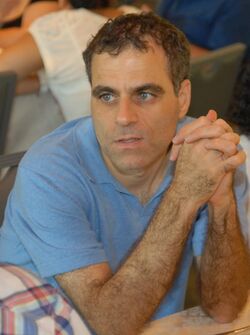Biography:Ran Raz
Ran Raz | |
|---|---|
רָן רָז | |
 | |
| Alma mater | Hebrew University of Jerusalem |
| Awards | Erdős Prize |
| Scientific career | |
| Fields | |
| Institutions |
|
| Thesis | Communication Complexity and Circuit Lower Bounds (1992) |
| Doctoral advisor |
|
| Doctoral students | Dana Moshkovitz |
| Website | www |
Ran Raz (Hebrew: רָן רָז) is an Israeli computer scientist who works in the area of computational complexity theory. He was a professor in the Faculty of Mathematics and Computer Science at the Weizmann Institute before becoming a professor of computer science at Princeton University.[1]
Raz received his Ph.D. at the Hebrew University of Jerusalem in 1992 under Avi Wigderson and Michael Ben-Or.[2]
Raz is well known for his work on interactive proof systems. His two most-cited papers are (Raz 1998) on multi-prover interactive proofs and (Raz Safra) on probabilistically checkable proofs.[3]
Raz received the Erdős Prize in 2002. In 2004, he received the Best Paper Award at ACM Symposium on Theory of Computing for (Raz 2004),[4] and the best paper award in IEEE Conference on Computational Complexity for (Raz Shpilka).[5] In 2008, the work (Moshkovitz Raz) received the Best Paper Award at IEEE Symposium on Foundations of Computer Science (FOCS).[6]
Selected publications
- Raz, Ran; Safra, Shmuel (1997), "A sub-constant error-probability low-degree test, and a sub-constant error-probability PCP characterization of NP", Proc. STOC 1997, pp. 475–484, doi:10.1145/258533.258641, ISBN 978-0-89791-888-6.
- Raz, Ran (1998), "A parallel repetition theorem", SIAM Journal on Computing 27 (3): 763–803, doi:10.1137/S0097539795280895.
- Raz, Ran (2004), "Multi-linear formulas for permanent and determinant are of super-polynomial size", Proc. STOC 2004, pp. 633–641, doi:10.1145/1007352.1007353, ISBN 978-1-58113-852-8.
- Raz, Ran; Shpilka, Amir (2004), "Deterministic polynomial identity testing in non commutative models", Proc. CCC 2004, pp. 215–222, doi:10.1109/CCC.2004.1313845, ISBN 978-0-7695-2120-6.
- "Two query PCP with sub-constant error", Proc. FOCS 2008, 2008, pp. 314–323, doi:10.1109/FOCS.2008.60, ISBN 978-0-7695-3436-7.
References
- ↑ "Raz, Weinberg Deepen Faculty's Leadership in Critical Areas | Computer Science Department at Princeton University" (in en). https://www.cs.princeton.edu/news/raz-weinberg-deepen-faculty%E2%80%99s-leadership-critical-areas.
- ↑ Ran Raz at the Mathematics Genealogy Project
- ↑ Citations counts for (Raz 1998) as of 21 Feb 2009: Google Scholar: 313, ISI Web of Knowledge: 120, ACM Digital Library: 57 + 17, MathSciNet: 53. Citations counts for (Raz Safra) as of 21 Feb 2009: Google Scholar: 314, ACM Digital Library: 71, MathSciNet: 59.
- ↑ Proc. STOC 2004: "STOC 2004 Conference Awards", page x. [1]. One of two award papers.
- ↑ Proc. CCC 2004: "Awards", page x. [2].
- ↑ Proc. FOCS 2008: "Foreword", page xii. [3].
 |
